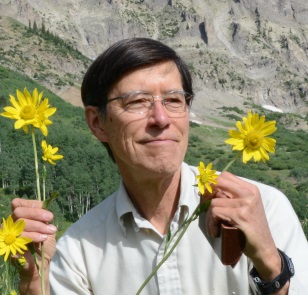UMD Professor David Inouye named President of the Ecological Society of America
FOR IMMEDIATE RELEASE: Tuesday, September 23, 2014
Contact: Alison Mize, 202-833-8773 ext. 205, gro.asenull@nosilA
 David Inouye, plant ecologist and professor emeritus of the Department of Biology at the University of Maryland (UMD), College Park has been named President of the Ecological Society of America.
David Inouye, plant ecologist and professor emeritus of the Department of Biology at the University of Maryland (UMD), College Park has been named President of the Ecological Society of America.
Elected by the members of ESA for a one-year term, Inouye presides over the world’s largest professional society of ecologists. Its membership comprises 10,000 researchers, educators, natural resource managers and students, reflecting the diverse interests and activities of the Society. As President, Inouye now chairs ESA’s governing board, which lays out the Society’s vision for overall goals and objectives.
“I’m greatly honored to be leading the ESA as it reaches its 100th anniversary. I’ve been a member for over four decades, since I was a graduate student, and have watched and participated as the Society has grown in membership, number and prestige of journals published, size of its annual meeting, and all other metrics of success.
The Washington, D.C. office provides a valuable service to government and other organizations by making the expertise of its membership available for advice on ecological issues, and we have an excellent educational program that is helping to train a diverse next generation of ecologists.
We will also expand our international impact this year as we jointly publish a new journal with the Ecological Society of China. I look forward to the next century of growth and success by the Society,” Inouye said.
Inouye’s pollinator and wildflower research has encompassed pollination biology, flowering phenology, plant demography and plant-animal interactions in both the US and abroad since 1971. Over his 44-year tenure at the Rocky Mountain Biological Lab near Crested Butte, Colorado, Inouye has discovered that the wildflower growing season has increased by 35 days since the 1970s. His long-term studies of flowering phenology and plant demography are providing insights into the effects of climate change at high altitudes.
He is a lead author for the Intergovernmental Platform on Biodiversity and Ecosystem Services (IPBES) fast-track assessment of pollinators, pollination and food production, sits on the governing boards of the North American Pollinator Protection Campaign and the USA-National Phenology Network, is a is a member of the National Academy of Sciences Roundtable on Public Information in the Life Sciences, and serves on numerous scientific publication editorial boards.
Inouye has taught courses in ecology and conservation biology at UMD and also instructed at the University of Colorado’s Mountain Research Station, the Rocky Mountain Biological Laboratory, and with the Organization for Tropical Studies.
###
ESA is the world’s largest community of professional ecologists and a trusted source of ecological knowledge, committed to advancing the understanding of life on Earth. The 10,000 member Society publishes sixjournalsand broadly shares ecological information through policy and media outreach and education initiatives. The Society’s Annual Meeting attracts over 3,000 attendees and features the most recent advances in ecological science. Visit the ESA website at https://www.esa.org.